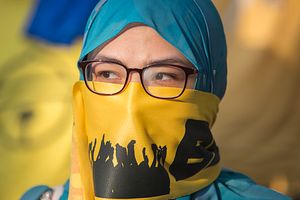Malaysia is preparing for General Elections, which are to be held by August 2018. Any day now, Prime Minister Najib Razak is expected to dissolve the parliament and announce the date of the electoral vote. Running for a second time for the prime minister position, Najib Razak faces Mahatir Mohamad, the 92-year-old former prime minister and now leader of the opposition. Barisan Nasional, the ruling party and the longest ruling coalition in the world, needs to attract more votes in order to maintain its majority in the parliament, a difficult task in the current Malaysian context of rising living costs and ongoing corruption scandals.
Last week, the government passed a controversial bill meant to redraw the electoral constituency borders and discussed adopting a law to curb the dissemination of “fake news” in mainstream and social media.
The long-disputed intention of redrawing the constituency borders became a reality, approved by the parliament in record time, after the Court of Appeal ruled in December 2017 that the Election Commission can proceed with the redelineation process.
Representatives of the opposition and civil society accuse Najib’s government of gerrymandering by packing opposition supporters in bigger constituencies and Muslim Malays, most of them BN supporters, in smaller constituencies.
“The concerns of civil society regarding the redelienation conducted by the Elections Commission [EC] started back in 2016 when the proposed boundaries were first published,” Malaysian civil rights lawyer Syahredzan Johan said. “Even back then we could see that the proposals would favor the ruling coalition. Despite numerous objections and challenges in Court on the new boundaries, it would appear that the EC has rejected most of them. It is feared that this unholy haste to pass the bill is to ensure that the new boundaries will be used in the upcoming GE, and if voters vote as they did in the last elections it would mean that the opposition will lose many of its marginal seats.”
The procedure will affect between a third and half of the 222 parliamentary seats.
The second law proposed last week awaits approval by parliament in the following days. It incriminates the publication of “fake news” on a diverse range of platforms, from media to social media in and outside Malaysia.
“This is a clear sign of desperation. They want this law to prevent further public discussion and criticism of the 1MDB scandal and other corruption scandals and wrongdoings of the BN. In pushing through the anti-fake news bill, the BN are clearly targeting the youth, who will become the main victims of this law,” opposition leader Anwar Ibrahim said in a press statement following the events.
The proposed measure, stating that offenders would be imprisoned for up to six years, raised concerns among human rights groups about freedom of expression in the country, which already has sedition laws in place. “The bill greatly expands the already broad set of laws in Malaysia, such as for criminal defamation, that penalize peaceful speech and create a climate of self-censorship and fear. The bill does not establish standards for determining what is false and does not distinguish between malicious falsehoods and simple errors on the part of a journalist or social media commentator,” said a report from Human Rights Watch issued on March 29.
De facto law minister Azalina Othman Said, who introduced the bill, said it would not restrict people’s freedom of speech, but stop the spread of fake news. “The Bill is to act as a deterrent to send a clear message to each individual to be responsible in sharing information that is true and right,” she said in a press statement.
Update: The “fake news” bill passed the Malaysian parliament on April 2, sparking more outrage from civil society.
Gerrymandering and media censorship are not new to Malaysia. In 2013, BN received 47 percent of the popular vote but managed to maintain a 60 percent majority in parliament.
Even with the opposition’s strong concerns and civic calls to action, recent polls show Najib and the current governing party winning the upcoming election.
Alexandra Radu is a photojournalist based in Kuala Lumpur. Her portfolio is available here.









































